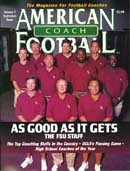Article CategoriesAFM Magazine
|
Q & A© More from this issueQ. If you went back to coaching high school football again, with all your experience, how would you approach it? A As a teaching job. I think you really have to focus on what's important to you in a high school job. What's important to me, with the way things are anymore, is to teach them the fundamentals of the game, first of all. Be a teacher and a coach. Don't get carried away with Xs and Os, get carried away with teaching them how to block and tackle, the thing that football's all about, no matter what level you're at. So make sure you teach that at a young age, and as you teach that you continue to add to what you're doing offensively and defensively. That's the football aspect of it, but the other thing is really trying to make sure they're going in the right direction in their lives. I admire high school coaches mor....The full article can only be seen by subscribers.
|
|
|||||||
| HOME |
MAGAZINE |
SUBSCRIBE | ONLINE COLUMNISTS | COACHING VIDEOS |
Copyright 2025, AmericanFootballMonthly.com
All Rights Reserved





